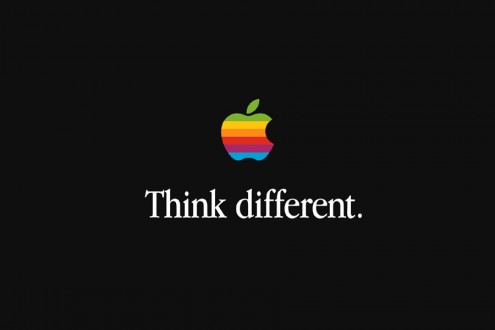
Last month, Apple became the second largest company in America, according to Fast Company. That said, Apple is now bigger than Google, Microsoft, Walmart, General Electric, or any other enterprise not named ExxonMobil.
Wow.
Continue reading…
As a self-employed individual, I’ve closed a lot of deals. Seven years worth, in fact. Enough to make me a thousandaire. But I’ve lost a lot more than I’ve won, something that’s expected in business.
What isn’t expected, however, are the rare occasions when a prospective buyer ridicules me for not meeting his terms. It usually happens like this: Buyer probes, likes what he sees, and then starts asking questions. We talk. I name my final price. He doesn’t like my final price.
But instead of walking away, like most sane buyers do, this buyer hangs around, and suddenly decides he no longer likes the free market. Continue reading…
In case you didn’t know, I don’t like Wall Street. It’s not that I think the stock exchange is wrong, but I don’t like how its description went from being “speculation” to “investment” in the last 50 years. And I don’t like how it’s primarily sold to the uninformed public.
If you watch TV, chances are you’ve seen numerous investment commercials for Prudential, ING, Pacific Life, Merill Lynch, Charles Swab and countless others. What you might not have seen is the fine print during all this commercials: “Investment products may lose value” and “Investments involve risk.”
This of course is neatly tucked away at the bottom of the screen while some voice over promises an increase in wealth, a secure future, and guaranteed retirement. It’s yet another reminder that what these people are really selling is speculation.
In other words, know your stuff before playing the game, or stick to what you know if you want to protect and grow your principle.
[youtube]http://www.youtube.com/watch?v=oWV6iklM_HQ[/youtube]Microsoft thinks so. And they’re newest commercial says so: “I can’t pick a restaurant in all these links,” an indecisive women using Google replies, when asked “What’s taking you so long?”
I can’t speak for everyone, but I’ve never felt overwhelmed by Google results. It’s not information overload if I find what I’m looking forward on the first results page, second at most. It’s almost as if Microsoft is confusing relevance with lack of choice.
I’m all for keeping Google on their toes through competition, but build a better mousetrap if you want to compete.
With a new decade upon us, the lemonade salesman in me is thinking about adding brownies to the menu. That is, I’m ready for my next big move, having already established myself as a new media tycoon.
So help me out, folks. Help me brainstorm and identify the next big thing. You know, a “Google killer.” I’m looking for a real win-win, here. Some ideas to get the juices flowing: Continue reading…

“Soccer is often mocked for its low scores, but precisely because goals are so scarce, the release of joy is greater than in other sports.” Soccernomics, page 295.
Of all the reasons to watch soccer, this is probably the most compelling. Admittedly, a tough football game, grinding tennis match, or nine nail-biting innings of baseball is more engaging than 90 minutes of soccer.
But provided there are goals, I can’t think of a sport that crescendos better than soccer. (Fascinating book, by the way—like a mix between Moneyball and Freakonomics).

As if Major Leauge Soccer didn’t have enough credibility challenges, the two opposing teams playing in this weekend’s championship will be outfitted by two suspect companies—as they have been all year.
In one corner, you have the LA Galaxy sponsored by Herbalife, a multi-level marketing company out of Los Angeles that sells magic herbs. In the other corner, you have Real Salt Lake sponsored by XanGo, a multi-level marketing company out of Utah that sells super juice. (Match preview here.)
Continue reading…

Simple Photoshoping of my company logo turns an otherwise crappy stock photo into digital wonder. Did this years ago but never had any use for it… until now!
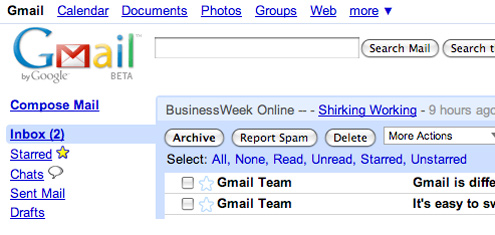
OREM, Utah — After four convenient but usually bad-habit forming years, I canceled my Blackberry email/data plan with T-Mobile last week. To my surprise, I was amazed that my email would actually wait for me on the computer, as opposed to following me around wherever I went. Now, if I’m away from my desk, my email will tell me how many unread messages I have upon my return, so as not to overlook anything. (Some fancy email programs even support audible alerts, such as “You’ve got mail!” Really neat stuff.)
In a flurry of discovery, and in search of more answers, I asked a representative of ARPANET, the inventor of email, for comment. “The great thing about email is that it’s free, provided you don’t give money to your cell phone provider for the same service,” the spokesman said. “And unlike the Post Office, you don’t have to put a hold on your mail if you’re away, say on nights and weekends. If it fits, it ships—which is all the time.”
Continue reading…

I heard Rudy Ruettiger speak this month as a guest at a neighboring university. Not only does he have a great story, he’s a great motivational speaker. Admittedly, I went because I love his movie—the greatest sports film ever made. But I stayed for his choice commentary on life, guts, and optimism. These are the nine ideas that most inspired me: Continue reading…

T-shirt companies were kind of a big deal five years ago. And I came close to launching one in 2004 during the height of the industry, before bailing on the idea a few months later due to manufacturing headaches. In any case, I was perusing the “design” folder on my hard drive today, and stumbled upon these favorites. Continue reading…
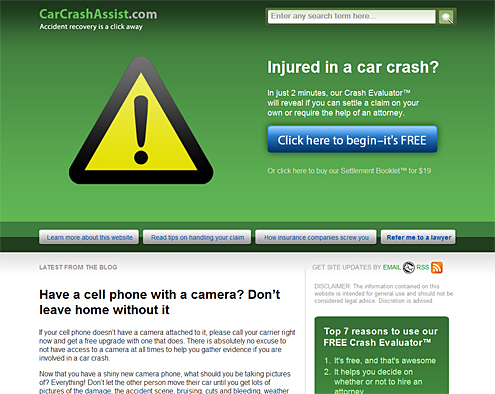
In addition to being a gun-for-hire, savvy readers know that Smooth Harold is also a part-time proprietor (aka entrepreneur on the side). I’m not a very good one—at least in terms of making money. But I enjoy building things. So I build websites. This is my latest.
Continue reading…
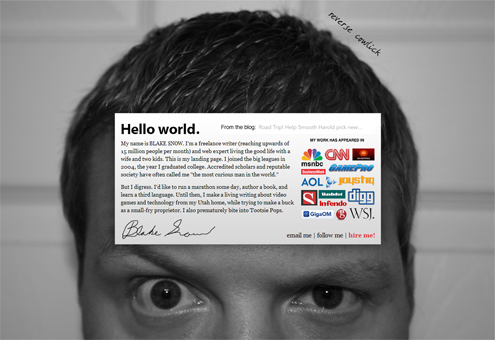
In an effort to centralize my online identity, I launched BlakeSnow.com this week. The site features state of the art HTML, some fancy javascript animation, and an enlarged photo of my shapely cranium. I’ll still be blogging under my pseudonym here, and maintain other websites as well, but this will serve as an entry point for people who don’t know me. Plus it makes me look cooler than I really am.
(Thanks, Robert)

MSNBC published a story yesterday that confirms what many of us already know: The almighty dollar is a lot more elusive these days, as Americans are working harder for less money. That’s been my experience, as I have to scrap a lot more now to make deals happen. Thankfully, there are still deals. For that I’m grateful. But my Mom put it best when she said, “They party’s over!” It sure is, Mom. It sure is. The upside: I got complacent at the party. So the down economy has been just the kick in the pants I’ve needed to double my creative efforts. The paper chase lives on!

Courtesy Shutterstock
I have found, as many before me, that with age comes added responsibility and a much larger to-do list. I’m arguably busier than I’ve ever been in my life with managing a marriage, a new baby, a company, and working on several other projects. Opportunity surrounds us, and I want to take it all in. I hope to learn, experience, and do as much as I can (or even can’t sometimes) throughout my life. I thoroughly enjoy meeting new people, learning new things, and finding other ways of applying the little that I know.
While pondering all of this on my way to Salt Lake City this morning and after catching myself saying “I’m so busy,” to those around me, I couldn’t help but think how this claim might sound to the receiver. Does that phrase add any value to the person listening? Does that make them feel important? If it doesn’t, then do away with it. Continue reading…
Smooth Harold reader Scott Daniel asks via email:
Does social networking really work as a marketing tool? My CIO is standing firm that it does not.
Yes, it does, provided you have something interesting to say. For example, my blogging efforts on Smooth Harold alone have directly resulted in checks amounting to around $17,000 over the last four years, excluding advertising. Continue reading…
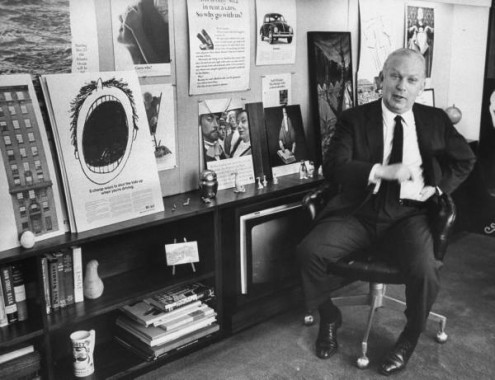
“The truth isn’t the truth until people believe you, and they can’t believe you if they don’t know what you’re saying, and they can’t know what you’re saying if they don’t listen to you, and they won’t listen to you if you’re not interesting, and you won’t be interesting unless you say things imaginatively, originally, freshly.”—William Bernbach, famed American copywriter
In sum, to be interesting you have to say things in ways other people don’t—but can still relate to. To be heard, you have to say interesting things as often and in as many places as possible. To be understood, you have to communicate clearly. And to tell the truth, you have to tell the truth, which can be found in everything. For example, Satan is undeniably “the most evil man in the world,” so if you are ever hired by the devil to sell more immorality, brand him as such in a creatively loud way and you’re gold.

New Yorker
I just got done reading Malcolm Gladwell’s How David Beats Goliath: When underdogs break the rules. It’s brilliant. The most inspiring essay I’ve read in at least two years. Instead of getting in the way, I’m just going to point you there, admonish you to print the 7,000 words, and read it. Afterwhich, you should full court press, challenge conventional wisdom, and display chutzpah for the rest of your life.
What do all those silly corporate titles really mean? Let’s find out.
According to Wikipedia, the Chairman (of the board) is pretty much the top dog. He elects the CEO and President who then elect the rest of the down line. The Chairman and the rest of the board are more concerned with governance while the CEO and President are more concerned with management. The distinction between governance and management allows for clear lines of authority with the aim being to prevent a conflict of interest and too much power being concentrated in the hands of one person.
The President can also be known as COO or chief operating officer, taking care of the day-to-day operations of the company while the CEO is more concerned with strategic management. The President or COO report directly to the CEO, and the CEO to the board.
These titles are generally used for large, public corporations, while partners (chair persons) and directors (managers) are typically used for smaller, private firms. There you have it.
Originally published Oct 21, 2005

In an effort to grow a handful of consumer websites that I publish, I’m seeking the help of a business manager (independent or otherwise) to hawk ad inventory for me. The biggest property, pictured above, generates 85,000 unique visitors per month and reaches 13,000 RSS subscribers. I also have a handful of other properties I’d like to monetize. If you or someone you know might be able to help, please email blake@griffio.com so we can chew the fat. Thanks! Now back to regularly scheduled programming.

Two years ago, I launched the Smooth Harold Helpdesk and Open Lunch Invitations (see sidebar). In that time I’ve met with more than a dozen individuals I previously didn’t know, fielded upwards of 50 email inquires—ranging from typography design to how to make a pregnant wife happy—and rekindled relationships with countless friends, colleagues, and associates. To say the program has broadened my horizons and created new opportunities would be a gross understatement.
“If you have a specific question you think I might be able to answer (business, web, personal, etc), don’t hesitate to ask via email or in person over lunch,” I wrote at the time. “If I don’t know the answer, chances are I can refer you to someone who does. And no, this isn’t ‘you scratch my back I scratch yours.’ It’s just a genuine attempt to share the little that I’ve learned from talking with people smarter than me, reading good books, and seeing what sticks.”
Continue reading…
The British had it right at one time. During the 19th century, their culture viewed stocks and securities exchange as a less than noble venture, according to the writings of Jane Austen and Charles Dickens—like how you and I look upon multi-level marketing companies today. Appropriately, the stock market was widely known then as “speculation.” A theory. A guess. An unverifiable promise or conclusion.
At some point, investment sharks (don’t call ’em bankers) hijacked the accurate description of “speculation” to mean “investments,” “stock market,” and “Wall Street”—prestigious terms that sound nothing like the conjecture they represent. Smart people made money on changes in the fickle market, giving hope to uninformed individuals, who blindly followed and still lose the majority, if not all their money, every few decades. Some are lucky. Most are not.
Continue reading…
A message—whether an email, voice-mail, sticky note, or blog post—is just a mini presentation. It’s a way of conveying information to an audience. To effectively do so, I try to adhere to the following 3 principles.
-
Be brief. Say what you need to say and nothing more. Keeping it simple will allow your audience to understand and remember what you want them to.
-
Be detailed. In what you do choose to say, tell the audience specifically what they need to know, including quantities, hard deadlines, and delivery.
-
Have structure. Write, record, annotate, say, or outline your message in an organized manner, so there is no confusion.
If you are brief, detailed, and structured when conveying information to an audience, your message will be loud and clear. Just be sure you have something important to say…
Now before any dreamy eyed Obama voters get offended by the timing of this, I’m in no way calling our nascent President a failure. I’m still hopeful. But as an American, I want answers, which is what good reporting should be seeking anyway. So why haven’t these questions been asked (or maybe I missed them)? Continue reading…
I haven’t taken a fortune cookie serious — let alone keep one — since… well, forever. Rather than predicting actual fortunes, almost all of them instead state the obvious or reference vague generalizations like, “Your friends have heartbeats,” or, “You’ll never know what you can do until you try.”
Dumb.
My latest fortune cookie, acquired last month after overpaying for an uneasy meal, was a keeper, however: “The project you have in mind will soon gain momentum.” I excitedly thought to myself, “Really? Which one? How soon? Tell me, omniscient Confucius!” I then slipped the two-inch piece of paper into my pocket and later onto my desk as a reminder of my fortune. After a discouraging precursor to Q1, I was willing to let even a cheap, dry cookie have an effect on my professional life.
Yesterday, I closed one of those deals — a reputable and ongoing account that is sure to bolster my portfolio and bank account. As a result, my faith in fortune cookies has been restored. My faith in suspect Chinese joints, on the other hand, has not.
Related: Let me dislike sushi in peace, please

In case you haven’t noticed, I’ve been pretty cynical about the great economic apocalypse of 2009 and our federal government’s questionable ways of dealing with it. Armed with a degree in business, I like to think I have all the economic answers, but I don’t.
Though I strongly disagree with frivolous spending, especially the kind that doesn’t create actual jobs, I’m not blind to the fact that it’s been going on for centuries. Hopefully good legislation will prevail again, and the people in power will make smart decisions and adjustments to support entrepreneurs.
So rather than complain and point fingers, I hope to contribute, starting with a sensible and positive outlook. Viva, la revolución!
I’ll let you in on a little secret: Beta, that silly subhead you see on so many websites, has been dead for quite some time. It just took a while before someone came out and said it. Here’s my latest from GigaOM, also syndicated on CNN/Fortune, entitled “Beta is dead”:
“Beta, as it pertains to web sites, has seen better days. Not long ago, saying the word as part of your web development cycle could help land venture capital even faster than claiming “community,” “paradigm shift” or “disruptive technology.” Now, the term is dissipated and confusing.
“While the specific origin of its use is unknown, beta as a tagline was popularized by a Google with the release of Google News in 2002, and later, Gmail in 2004. From there, startups quickly followed suit. By 2006, it seemed like every new web site was “in beta.” Continue reading…
See also:
Originally published December 19, 2006.
Here’s stating the obvious: Most employee appreciation bonuses are lousy, exposing how cheap corporate America can be. Take for example my good friend Matt and his wife Susan. Both are honest working individuals that are extremely kind to those they come in contact with and extremely loyal to the companies they work for. Susan has worked close to 10 years for a local manufacturer. What did she get after working five years for the company? A small shelf clock. And Matt, having worked at a local credit union for five years, got a whopping $50 bonus for his tenure. Nothing says “we care” and “the biggest asset to our company is our employees” quite like skimping when it counts. That’s not to say Susan’s or Matt’s employers are shmoes, just that they suck when it comes to appreciation bonuses.
Continue reading…
I interviewed Chris Anderson (Wired editor, Long Tail author) for a story I’m working on about the future of beta as it pertains to the web. While talking, I digressed to the subject of business models, to which he said, “I think launching without a business model is fine, if your costs are low enough.”
A year ago, I would have no problem agreeing with Anderson, especially given the low overhead qualifier. Google launched without a business model — why not? But in an depressed economy where credit is tight, consumers aren’t spending, and job security is threatened, I’m not so sure.
Convince me, dear reader: Is it ever okay to launch a company without a business model?
Boston.com has published an interesting story surmising what a depression in the 21st century might be like. While the Great Depression and all its similarities to our current situation was very public, the New Depression (defined as a recession lasting a few years and unemployment upwards of 25%) will be very private, the article suggests, given the proliferation of the Internet to perform many daily duties including shopping, banking, entertainment, and communication. In short, author Drake Bennett expects long lines at the ER since people will drop their health insurance, a television boom since it’s the cheapest form of entertainment (movies and baseball were in the 30s, but not anymore), and barren suburbs due to crashing home values. Oh, and those shiny gadgets (bu-bye iPhones) will be traded in for reliable and durable tech like Nextel phones, and people will stop consuming organic food and other snobbery items because they’re too expensive.
[Thanks, Connor]

Associated Press
… The world financial markets fall more than they would have, because financial markets are based entirely on confidence. And when you have intimidating officials like President Bush and McBama spreading FUD like, “the worst economic crisis since the great depression,” fickle investors will believe them, and global bank markets struggle.
I’m not saying there wasn’t a partial bomb to begin with — there was thanks to a greedy and irresponsible Wall Street — but that still doesn’t mean top officials can frighten the public with said statements just to bail out their Wall Street buddies who donated lots of money for special interest (which they succeeded in getting this time). Just like yelling “Bomb!” in an airport is illegal, so should it be for individuals in power crying “depression” just to get their way.
Continue reading…
I fear for the future value of my hard-earned dollar. I no longer trust the federal government with spending, nor do countries abroad. When that happens en masse, the dollar will crash.
Sadly, that’s the price we pay for electing big-government knuckleheads into office, and for letting the Federal Reserve buy 80 percent of AIG for $95 billion without a vote, even though U.S. taxpayers will have to pick up the tab.
Man, is our federal government broken (I trust state government so much more right now). When will they understand that “this insanity and the problems we face economically will only occur when we allow the economy to find its own equilibrium. We have to allow the market to endure a recession, we have to allow failure.” — Joe M.
For the sake of our country, at the least to make a statement, write in Ron Paul for president this November. It appears McBama will only continue the trend of frivolous spending and federal intervention.
See also:
The United States is nearing bankruptcy, and yet officials want to borrow more money (!) to curb economic woes, according to today’s headlines. It’s amazing how fiscally incompetent these knuckleheads have become — they’ve all but defecated on our once precious dollar.
As harsh as it sounds, natural consequences (i.e. bankruptcy, foreclosures, loss of jobs) is the only way to atone for our country’s overly optimistic and unchecked enthusiasm of recent years. This includes irresponsible land developers, loan officers, politicians, investment bankers, and home owners who bit off more than they could chew — all of whom ignored the basic principles of supply and demand.
Dude, where’s my country? I feel like I’m taking crazy pills.
See also:
 Ars Technica has a nice summation of the rhythm wars, aka the battle between Guitar Hero and Rock Band for rhythm game (and profit) supremacy. So who will win? From the article:
Ars Technica has a nice summation of the rhythm wars, aka the battle between Guitar Hero and Rock Band for rhythm game (and profit) supremacy. So who will win? From the article:
For rock fans, picking a title could be as simple as one track or one band that tips that scales; assuming that both games are fun to play and the hardware works well enough, the track list is what will move rhythm games of the future.
It’s worth noting that Guitar Hero sells significantly more games, while Rock Band sells significantly more digital downloads. And save only the music creator of Guitar Hero, both games are near-identical in features, including separate online stores.
Personally, I prefer Guitar Hero to Rock Band (having played both extensively), because the music is more rocking, the peripherals are sturdier, and the difficulty is more challenging. Plus, it’s the original gangsta of rock video games in America.
If you’ve never played Xbox 360, you probably missed it.
During the final action sequence of Transformers (2007), at precisely two hours, two minutes, and 25 seconds in, gamers are treated to a recognizable image and sound: a newly purchased Xbox 360 with its accompanying audio logo.
The brief product placement lasts no longer than 1 ½ seconds, as the popular console transforms on-screen into a hostile robot, after its owner becomes entangled with evil forces, while innocently shopping the streets of Las Vegas.
“I think a lot of Xbox fans got a kick out of it,” says Eli Friedman, director of Xbox Global Brand Marketing. “When we learned Transformers was being made into a movie, we jumped at the opportunity to work with Paramount Pictures since much of our core audience also happens to be Transformers fans.”
Continue reading at Edge Online…
The Utah Department of Transportation is currently widening the road (800 N) in front of my apartment. It hasn’t been the end of the world, but it’s still a nuisance — not only for local residents but for street side retailers trying to drive business.
One such retailer, a truck dealership, began commandeering the unfinished lanes in front of his property over the weekends (while UDOT isn’t working) to showcase his trucks and lure in customers. When I first saw this a couple months back, I said to myself in snooty fashion: “He can’t do that. He doesn’t own those lanes — those are public.”
Continue reading…
harvardbusiness.com — “Zappos sells shoes —lots of them—over the Internet. After a week or so of employment with the company, it’s time for what Zappos calls “The Offer.” “If you quit today, we will pay you for the amount of time you’ve worked, plus we will offer you a $1,000 bonus.” Zappos actually bribes its new employees to quit!”
It pays to be in it for the long haul…
For any interested, here is a handful of my recently published video game works after my visit to Baton Rouge two weeks ago.
The 10 Most Underrated Consoles (GamePro) — The road to modern video games is littered with the corpses of noble game consoles who flew too high to the sun. Here are the 10 best under-achievers of all-time.
Not Every Politician Hates Video games (Crispy Gamer) — At a VIP game developer event in a secluded upstairs San Francisco lounge, a well-dressed man in his 50s is making the rounds. “Hello, I’m the mayor of Baton Rouge.” “Do you just walk around calling yourself a mayor?” asks one doubting attendee. “No, I’m really the mayor of of Baton Rouge…” Continue reading…
 American Way has a whimsical article in their April 15 issue which profiles distinct-looking, non attractive amateur models, and how they’re making one New York agency popular with advertisers seeking greater image authenticity.
American Way has a whimsical article in their April 15 issue which profiles distinct-looking, non attractive amateur models, and how they’re making one New York agency popular with advertisers seeking greater image authenticity.
DiNardo, at 6 feet tall and 170 pounds, with stringy locks held back by a headband and tufts of hair encircling his chin, could be any random guy you’d pass on the street. And that’s the reason that Simon Rogers, owner and CEO of Ugly NY, wants to represent him. “Tom’s very arresting, isn’t he?” Rogers says admiringly.
Ugly commissions range from an occasional few hundred dollars to $2,000/shoot — hardly substantial, but gravy for people who were never looking to model in the first place. I love seeing people zig while others zag and get rewarded for it.
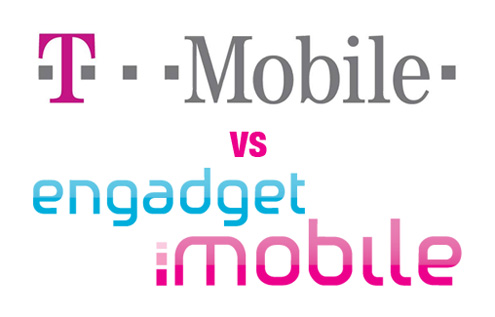
Engadget tells the story: “So last week Deutsche Telekom, owners of the global T-Mobile brand, sent Engadget a late birthday present: a hand-delivered letter direct from their German legal department requesting the prompt discontinuation of the use of the color magenta on Engadget Mobile. Yep, seriously.”
If you read the legalese, the company says it “holds trademark protection for this use of this color in connection with its products and services around the world.”
Since when could you copyright a color, even in connection with a product or service? Ridiculous — otherwise Apple could sue any computer-maker that used the color white (though white’s not really a color, so that opens another can of worms).
Atta way to exploit legal muscle, T-Mobile. Nice form. Really. This totally makes me want to stay with you instead of jumping to AT&T’s iPhone.
[youtube]http://www.youtube.com/watch?v=EHCRimwRGLs[/youtube]
IDG News (whom I freelance for) reports: “Microsoft’s brand power has been in sharp decline over the past four years, an indication the company is losing credibility and mindshare with U.S. business users, according to a recent study by market research firm CoreBrand.”
I enjoy seeing fat business cows get a proper market cleansing.
Continue reading…

Contrary to popular belief suggesting that radical transparency is the best modern way to operate a business, Apple has circled its competition by being radically opaque, according to Wired Magazine.
No other company has proven as adept at giving customers what they want before they know they want it. Undoubtedly, this is due to Jobs’ unique creative vision. But it’s also a function of his management practices. By exerting unrelenting control over his employees, his image, and even his customers [while endorsing secrecy], Jobs exerts unrelenting control over his products and how they’re used. And in a consumer-focused tech industry, the products are what matter.
Though I believe Steve Jobs is a management anomaly, there’s obviously more than one way to make an honest buck. In any case, follow the Wired link for an insightful and challenging viewpoint on closed communication.
I nuke hard sell comments as soon as they are published to Smooth Harold (read: “Nice blog! Check out this really cool snake oil!”). I also reserve the right to delete profane or otherwise mindless provocative comments while Akismet takes care of the spam.
But what do I do with soft sell comments? The comments that are relevant and might add value to some readers even if a salesman is behind them.
Continue reading…
After four years, I canceled my Vonage line on Friday. I only used 20 minutes per month on average over the last year, so it made sense in my case to ditch the service, even though it works fine. Instead, I will rely solely on Blackberry and Skype for voice chat, as I have done for personal use since 2003.
I have so far managed to cut back my phone use by only answering expected or known calls. I check voice mail as soon as I’m notified, and I have a policy of returning both calls and emails within two working hours.
I tell my professional contacts that email is “preferred,” and my cell phone is “secondary.” To further encourage asynchronous communication, I reward emailers with faster response times. It works cleverly well, and I’m one step closer to my goal of ditching web access for an entire year. Whatever it takes.
 I just got done reading Chris Anderson’s 6,000 word preview for his upcoming book Free! Why $0.00 Is the Future of Business. In short, the article examines cross-subsidies (read: giving away razors to sell razor blades) as they pertain to the web products and their near-zero operating costs. You can have a free lunch so long as someone else picks up the tab, maintains Anderson.
I just got done reading Chris Anderson’s 6,000 word preview for his upcoming book Free! Why $0.00 Is the Future of Business. In short, the article examines cross-subsidies (read: giving away razors to sell razor blades) as they pertain to the web products and their near-zero operating costs. You can have a free lunch so long as someone else picks up the tab, maintains Anderson.
While the article was informative, I don’t think the strategy of giving is “the future of business,” rather it’s an effective marketing tool for select web companies — not everyone, and especially not for offline ventures. Still, Anderson presents some compelling evidence that “free” will become more ubiquitous than I currently believe.
Ironically, and in an effort to deflect the “wait a minute, your product isn’t free” criticism, Wired is offering up to 10,000 copies of its March 2008 issue at not cost to you (a fraction of the 500,000+ issues the publisher sells every month, mind you). Not quite what I’d call “practice what you preach,” but then again, I don’t think Anderson’s article endorses the demise of direct sales altogether, even if his headline does.
Lindsey and I were discussing off-brands last month with our good friends, the Andersens — specifically, what generic imitations we refuse to buy as consumers. Personally, I will never substitute the following products with an inexpensive alternative:
Continue reading…
Lindsey and I finished our taxes early this year, e-filing on Tuesday with our people. It feels good to put that one in the “completed” folder.
What’s more, I saved a grundle in 2007 by filing as an s-corp instead of a partnership (note: the federal government does not recognize an LLC, a state entity, so Uncle Sam defaults to a partnership filing for tax purposes). Couple that with an additional tax credit for our second child born in October, and the Snow family will be spoiled with its first return in three years.
The downside: flat revenues also contributed to the return, though I honestly can’t complain. Not one bit. Have you done your taxes?
My Blackberry inexplicably died on Saturday afternoon while napping on the kitchen counter. Two years of age seemingly put the kibosh on the device’s ability to connect to T-mobile.
So I called T-mobile to solve the issue. It turned out my phone had in fact died and was no longer under warranty. I would need to buy a new phone.
Reality bearing down, I decided to do what I’ve done so many times to successful results as a consumer: ask if my continued business would be worth an exception — in this case having to fork over $100 for a replacement.
“You’ve been with us a long time, Mr. Snow,” the last manager happily said over the phone. “We’ll send out a new phone right away (read: your $1200/year cell phone account is worth a $100 concession).”
Half of life is simply asking.
Seth Mnookin, a freelancer of four years, waxes poetic on the subject of unproductive efficiency in a recent Wired column:
“My campaign to increase productivity had become yet another distraction — and a significant one. Suddenly I needed to time-manage my time management… [so] I forced myself to quit optimizing how I get things done and start actually getting things done.”
Amen to that — and precisely in line with what Timothy Ferriss counsels in The 4-Hour Work Week. Productivity, not efficiency, is paramount. Now if I could only practice what I preach…
Answer: prominently list your service fees on your home page to weed out unfitting clients.
If you sell products, this is a no-brainer. But since a majority of U.S. business are service-based companies, this is a must if you want to spend more time closing business instead of qualifying it. At the least, and when using custom bids, you should be listing your minimum purchase order on your home page (yes, I said home page) — and DON’T bury your pricing; make it palpable.
“But I don’t compete on pricing, so there’s no need to list my fees,” you may exclaim. Neither do I. But the reality remains that a majority of consumers still do, so you’d be wise in politely showing ill-suited customers the door sooner rather than later — it really is better for all involved.
I’ve been doing this for two years now and can honestly say it has increased my close rate while improving my sales effectiveness (read: no more wasting time on clients I’m not well-suited for). I regularly refer prospective web clients to my single-page (though outdated) site to ensure they understand from the get-go if I’m within their budget.


















 Ars Technica has a
Ars Technica has a  American Way has a
American Way has a 

 I just got done reading Chris Anderson’s 6,000 word preview for his upcoming book
I just got done reading Chris Anderson’s 6,000 word preview for his upcoming book